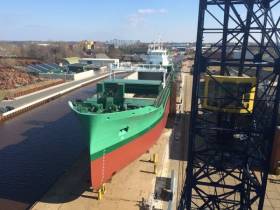Displaying items by tag: Five Decades of Operations
#TheTyrrells – Fifty years ago Arklow Shipping was formed, following the amalgamation in 1966 of three independent shipowning families from the east coast port in Co. Wicklow, writes Jehan Ashmore.
The families, Tyrrell, Kearon and the Hall’s all had origins directly in trading auxiliary sailing schooners from the banks of the River Avoca that flows through Arklow into the Irish Sea. The era of the days of sail trading were coming to a close during the 1950’s and ‘60’s as motorised coasters were increasingly taking over from the traditional schooners of the single-ship owners.
It was felt in certain quarters that such practises needed to be overhauled so to compete. This led to a co-operative which removed inefficiencies of the independent shipowners and instead by pooling resources to reduce costs.
The decline of the schooners by more efficient coasters led to the last Irish Sea schooner, De Wadden disposed. The vessel remains on display at the Merseyside Maritime Museum, Liverpool.
In the earliest formation to pool resources, the Arklow shipowners acquired a 12 year old German ship. The vessel had been taken as a war prize in 1945 by the British Admiralty and was sold in 1947 to trade with the Arklow families and renamed Tyrronall.
The coaster, Tyrronell derived its name from three letters chosen from the family surnames. The co-operative progressed when in 1966, Captains James Tyrrell, Michael Tyrrell and Victor Hall formed an umbrella company, Arklow Shipping under which together operated seven ships.
Under the following ship-owners: James Tyrrell Ltd contributed vessels (Darell, Valzell, Mariezell and Murell), Captain Michael Tyrrell (Avondale), Captain Richard Hall (River Avoca) and George Kearon Ltd (Reginald Kearon and Gloria). Of this initial fleet, all but two were managed by ASL.
It was not until 1970 that officially the company, Arklow Shipping Ltd was formed and over the next five decades, ASL have acquired numerous second-hand tonnage and ordered series of custom built vessels, notably from yards in the Netherlands, Spain and Korea.
The vessel naming nomenclature is now based on a nominated letter. i.e. the latest is 'V' for the recent newbuild series, in which Arklow Valiant was launched last month. This vessel is the third of 10 newbuild 5,100dwat tonnes general cargsoships completed by Dutch yard, Royal Bodewes.
Asides the newbuild, the fleet total is 45-strong and ships are either general dry-cargo traders or bulk-carriers. The smallest series in the fleet are the 'R' class, for example, Arklow Rose of 4,933dwt to the largest 'S' class bulkers, the Arklow Spray of 34,905dwt. Both vessels are Irish flagged and unlike the newbuilds will be Dutch flagged under Arklow Shipping Nederland B.V.
Across the ASL fleet, they transport a variety of cargoes among them in the bulk grain trades, steel rails, minerals, generals and containers.
The trading area is mostly north-western Europe though the bulk-carriers operate on international deep-sea trade routes.
























































